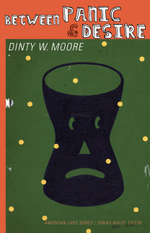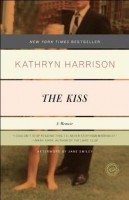6 Books: Dinty W. Moore on Memoir
 This is the first installment in a new feature where I ask a writer to recommend 6 books, old or new, sometimes according to some roomy guideline. In this case, I asked Dinty W. Moore, editor of Brevity and author of the memoir-in-essays, Between Panic and Desire, to recommend 6 memoirs. Here’s what he had to offer.
This is the first installment in a new feature where I ask a writer to recommend 6 books, old or new, sometimes according to some roomy guideline. In this case, I asked Dinty W. Moore, editor of Brevity and author of the memoir-in-essays, Between Panic and Desire, to recommend 6 memoirs. Here’s what he had to offer.
Narrowing my list of representative memoirs down to six was an agonizing task, because there are so many solid examples. To keep the undertaking manageable (barely), I’ve limited myself to the last twenty years or so, and instead of a ‘favorites’ list, I’ve chosen six examples that I think show the range of what memoir can do.
My concise description of memoir is “the truth, artfully arranged.” Now we can argue about the meaning of the word truth for weeks, but I’d rather not. I think – despite all of the weakness of memory (and for that matter, observation) – that sophisticated readers understand that the truth they are given in memoir is the author’s subjective truth. There is no hope of objective accuracy, nor would that be as interesting to read. But you go after your truth, with honest intent. That means that an author who is willingly, consciously subverting what he remembers is not writing memoir, by my definition. Cross that line, and you are writing fiction. Which is fine, but it is another project entirely.
So I’ve pulled these six memoirs down from my shelves to illustrate how a life can be presented artfully. Starting with:
This Boy’s Life, Tobias Wolff (1989): Wolff’s memoir is the first that I remember reading. I had read autobiography, of course, and long-form journalism, but Wolff’s brutally-honest, cinematic childhood memoir was the first to give me what previously I had only found in novels: the ability to escape into someone else’s life and another world, another time. Wolff wasn’t the first to write memoir in this way, but This Boy’s Life remains a touchstone to me and many other writers. I love the opening note to the reader: “I have been corrected on some points, mostly of chronology. Also my mother thinks that a dog I describe as ugly was actually quite handsome. I’ve allowed some of these points to stand, because this is a book of memory, and memory has its own story to tell.”
 The Kiss, Kathryn Harrison (1997): Like many people, my first introduction to this book was the wave of denunciation that followed its release: denunciation of the author’s life (she engaged as a young woman in an incestuous relationship with her estranged father), and denunciation of the author’s decision to speak of it in this book. Thank goodness I eventually read The Kiss. Harrison’s restraint, her precision, her shocking honesty, and the chilling detail combine to create an unforgettable psychological portrait. Should victims remain silent? Hell no. (Random House is reissuing The Kiss next month.)
The Kiss, Kathryn Harrison (1997): Like many people, my first introduction to this book was the wave of denunciation that followed its release: denunciation of the author’s life (she engaged as a young woman in an incestuous relationship with her estranged father), and denunciation of the author’s decision to speak of it in this book. Thank goodness I eventually read The Kiss. Harrison’s restraint, her precision, her shocking honesty, and the chilling detail combine to create an unforgettable psychological portrait. Should victims remain silent? Hell no. (Random House is reissuing The Kiss next month.)
A Heartbreaking Work of Staggering Genius Dave Eggers (2000): Not my favorite book to read, frankly – it goes on too long in places, seems too clever by half in others – but Eggers shook up the form, opened possibilities, brought younger readers into the genre, and I tip my hat to him for the chances he took.
